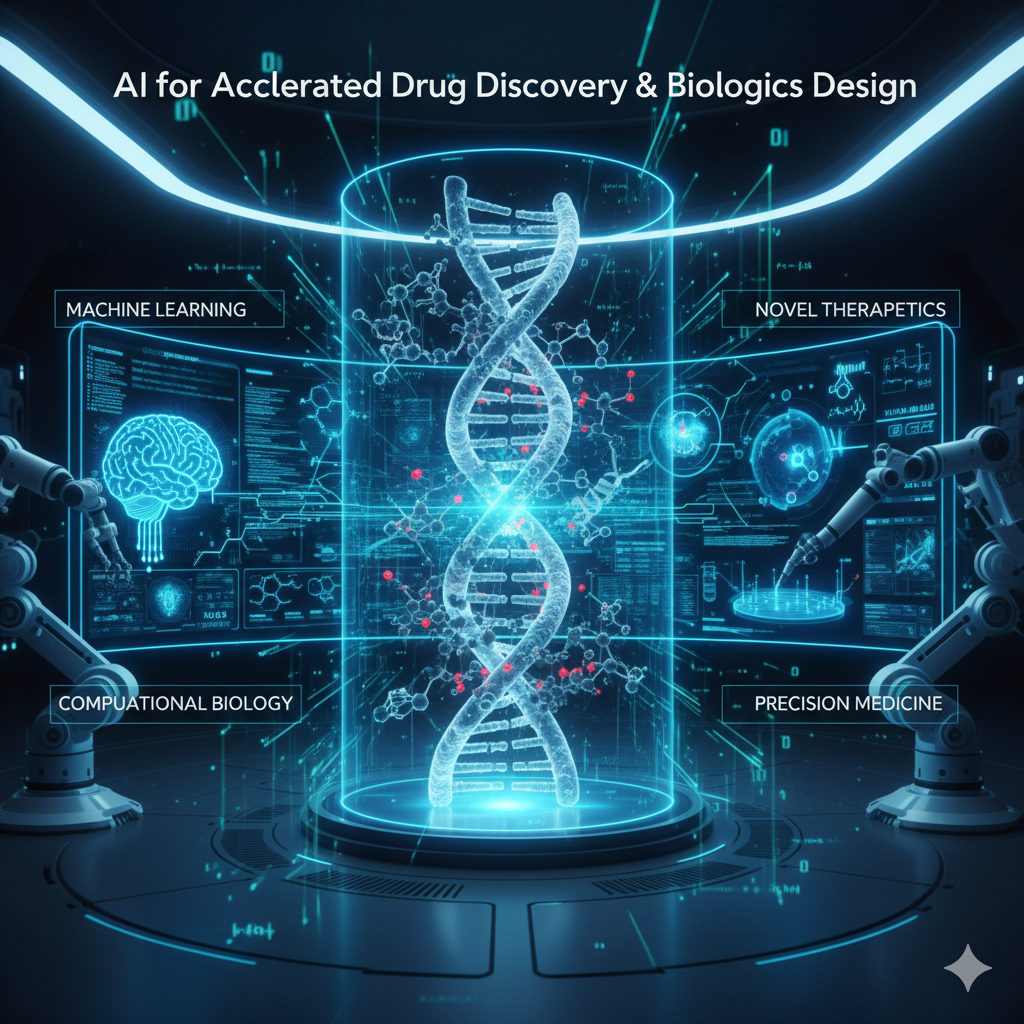🧠 What Is AI in Drug Discovery?
AI (Artificial Intelligence) has an impact on how scientists discover and create new medicines. , scientists needed 10–15 years and billions of dollars to produce a new drug. Now, AI and Machine Learning (ML) allow researchers to examine data, test theories, and forecast outcomes much quicker — at times in months rather than years.
This method also applies to biologics design — medicines derived from living organisms such as proteins, antibodies, and vaccines. AI enables scientists to grasp how these intricate biological molecules function and how they can be enhanced to treat illnesses more .
⚙️ How AI Has an Impact on Drug Discovery
AI acts as an quick helper that can examine millions of data points and spot patterns that might escape human notice. This is how it works, step by step:
- Finding the Disease Target AI examines scientific data to identify genes or proteins that have an impact on a disease.
- Creating New Molecules AI tools, like generative AI, can design new chemical structures that might function as medicines.
- Testing (Before the Lab) Rather than testing thousands of samples in a lab, AI conducts virtual experiments to determine which compounds are most likely to be effective.
- Improving the Drug AI helps to refine molecules to make them safer more effective, and longer lasting.
- Planning Clinical Trials AI examines patient data to select the best candidates for trials and to predict possible side effects .
🧬 How AI Helps in Biologics Design
Biologics are cutting-edge medicines created using living cells — like antibodies and vaccines. AI has a revolutionary effect on their creation by:
- Forecasting protein folding and behavior (as DeepMind’s AlphaFold does).
- Creating synthetic antibodies to target specific diseases.
- Modeling biological molecule reactions inside the body.
- Unearthing new proteins and enzymes for future treatments.
📍 Example: In 2025, biotech company Nabla Bio teamed up with Takeda Pharmaceuticals to use AI to design new antibody-based drugs — cutting the development time from years to months.
🚀 Benefits of Using AI in Drug Discovery
| Benefit | Description |
|---|---|
| Faster Results | AI reduces research time from years to months. |
| Lower Costs | Saves money by reducing lab experiments and failures. |
| More Accurate | Finds the right drug targets with high precision. |
| Personalized Medicine | Helps create treatments for individual patients. |
| New Discoveries | Finds cures for diseases that were once untreatable. |
⚠️ Challenges AI Still Faces
AI has a lot going for it, but it’s not flawless yet. A few hurdles stand in the way:
- Data Problems: AI needs tons of top-notch data to function .
- Regulations: AI-created drugs have to clear tough tests before they get the green light.
- Ethics & Privacy: Keeping patient info safe is a major worry.
- Transparency: Some AI systems are like puzzles – it’s tricky to figure out how they reach their conclusions.
🔮 The Future of AI in Medicine (2025–2030)
The next few years will usher in even bigger shifts in healthcare through AI:
- AI + Quantum Computing: To run molecular simulations in seconds.
- Digital Twins: Virtual models of humans to test drugs .
- AI-Powered Personalized Treatments: Drugs tailored to each individual’s biology.
- More Collaboration: Drug companies and tech firms joining forces to speed up cure discovery.
AI won’t take the place of scientists — it will help them to find new medicines quicker and make healthcare cheaper and better for everyone.
